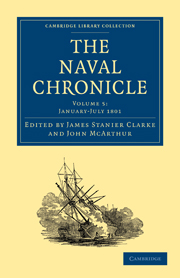 The Naval Chronicle
The Naval Chronicle Book contents
- Frontmatter
- PREFACE TO THE FIFTH VOLUME
- PLATES IN THIS VOLUME
- BIOGRAPHICAL MEMOIRS OF SIR EDWARD HAMILTON, KNIGHT
- BIOGRAPHICAL MEMOIRS OF COMMODORE WILLIAM LOCKER, LATE LIEUTENANT GOVERNOR OF GREENWICH HOSPITAL
- BIOGRAPHICAL MEMOIRS OF SIR ROBERT KINGSMILL, BART. ADMIRAL OF THE BLUE SQUADRON
- BIOGRAPHICAL MEMOIRS OF SIR HYDE PARKER, BART
- BIOGRAPHICAL MEMOIRS OF THE RIGHT HON. THOMAS LORD GRAVES, ADMIRAL OF THE WHITE SQUADRON
- BIOGRAPHICAL MEMOIRS OF SIR WILLIAM GEORGE FAIRFAX, KNT. REAR-ADMIRAL OF THE BLUE SQUADRON
- BIOGRAPHICAL MEMOIRS OF CAPTAIN EDWARD RIOU
- INDEX
BIOGRAPHICAL MEMOIRS OF SIR HYDE PARKER, BART
Published online by Cambridge University Press: 10 January 2011
- Frontmatter
- PREFACE TO THE FIFTH VOLUME
- PLATES IN THIS VOLUME
- BIOGRAPHICAL MEMOIRS OF SIR EDWARD HAMILTON, KNIGHT
- BIOGRAPHICAL MEMOIRS OF COMMODORE WILLIAM LOCKER, LATE LIEUTENANT GOVERNOR OF GREENWICH HOSPITAL
- BIOGRAPHICAL MEMOIRS OF SIR ROBERT KINGSMILL, BART. ADMIRAL OF THE BLUE SQUADRON
- BIOGRAPHICAL MEMOIRS OF SIR HYDE PARKER, BART
- BIOGRAPHICAL MEMOIRS OF THE RIGHT HON. THOMAS LORD GRAVES, ADMIRAL OF THE WHITE SQUADRON
- BIOGRAPHICAL MEMOIRS OF SIR WILLIAM GEORGE FAIRFAX, KNT. REAR-ADMIRAL OF THE BLUE SQUADRON
- BIOGRAPHICAL MEMOIRS OF CAPTAIN EDWARD RIOU
- INDEX
Summary
Yes, die by piece-meal,
Leave not a limb o'er which a Dane may triumph.
Now from my foul I joy, I joy, my friends,
To see you fear'd; to see that even your foes
Do justice to your valours! there they be
The powers of kingdoms summ'd in yonder host,
Yet kept aloof, yet trembling to assail you.
Brooke.Fortes creantur fortibus et bonis. The brave and virtuous man is debased not by his offspring, he views with silent pleasure the noble spirit which he himself inherited from his ancestors, rising with redoubled vigour in his descendants, and gazes in ecstacy, mixed with an honest pride, on their youthful virtues. The long, the gallant services, and the supposed untimely death of the brave but unfortunate parent, are too strongly impressed on the gratitude of Britons not to create the liveliest sensations of regard and affection for the son; the former are too recent and the latter too melancholy, to render any recapitulation of either, necessary in this place.
Sir Hyde being destined by his father for the Navy, as well from the strong inclination, which in the earliest youth he manifested towards a maritime life, as the natural predilection possessed by his parent in favour of a service on which he undoubtedly reflected so much honour, was entered when extremely young on board the Lively frigate, a ship at that time commanded by Capt. Parker, under whom he afterwards served in 1757, in the capacity of midshipman or mate on board the Squirrel.
- Type
- Chapter
- Information
- The Naval ChronicleContaining a General and Biographical History of the Royal Navy of the United Kingdom with a Variety of Original Papers on Nautical Subjects, pp. 281 - 376Publisher: Cambridge University PressPrint publication year: 2010First published in: 1801


